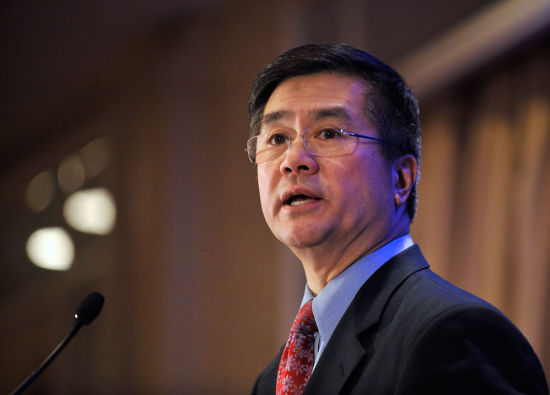骆家辉:大洋芳邻共同走过四十载
http://msn.finance.sina.com.cn 2012-02-14 19:10 来源: 《财经网》
 图为美国驻华大使骆家辉。资料图
图为美国驻华大使骆家辉。资料图
美国驻华大使骆家辉/文
本周,美国副总统约瑟夫·拜登和中国国家副主席习近平将在美国举行一次历史性会晤。此行距1972年2月美国总统尼克松历史性访华几乎整40载。回首过去,美中关系有许多足堪称道之处,令两国持久受益,并为两国人民带来显著的经济收益。
中国令人瞩目的增长的动力来自其经济改革、原创力和辛勤工作;然而,它也因能够更多地进入国际市场、获得新技术和来自美国和其他主要经济体的直接投资而变得可能。
美国也从双边关系中受益匪浅。去年我们向中国的出口额近1040亿美元,比2010年增长13%,比2009年高出40%多。在这个经济复苏的时刻,我们格外重视对华贸易关系。
我们的经济当然是互补性的。中国是美国农产品最大的出口市场。去年,中国采购了大量美国玉米。创纪录的农产品出口则在整体上帮助爱荷华州等农耕州创造了就业。爱荷华州也是本次习近平副主席美国之行的访问目的地之一。这些出口通过降低因干旱和疾病诱发的食品价格通胀及时帮助了中国。
在教育领域,越来越多的中国人获得了进入美国顶级大学和学院的机会。在我的家乡华盛顿州,华盛顿大学报告说,今年外籍学生占新生总数的将近18%,其中绝大多数是中国人。在这一日益发展的全国性趋势中,美国学校不仅从学费收入中受益,也为美国学生提供了与中国未来领导人们结交的机会。这促进了相互理解,在未来几年里这种相互理解对两国人民都至关重要。正是因为认识到这种互动的价值,奥巴马总统在2009年宣布了“十万强计划,”这是他的行政当局为增加学习普通话和在中国留学的美国学生而做出的独特努力 – 它是我们两国共同的进步中一项重要的长期投资。
即使在美中关系那些需要改善的领域里,我们也有根本上的共同利益。美国希望一个基于市场的汇率和利率形成机制,希望保护知识财产。长期而言,中国也是如此。中国的“五年计划”谋求让自身经济远离以重工业为基础、以出口为导向的增长,而转向可持续的经济模式,其动力来自创新和更高的居民支出。只有知识财产受到保护,创新才可以发展壮大。只有当其存款获得合理回报时,家庭存款和消费才能增长。
我们知道中国想要的是更好地获取旅游签证的途径、高科技商品、以及在美国市场的投资机会。这些目标没有一个与美国的利益存在根本分歧。美国公司将会受益于以终端民用为目的所增加的高科技商品出口。当中国公司在美国建立工厂或办公室时,美国人有更多就业机会。
看到中国正在进行的经济改革获得成功,也符合两国利益,比如减少对信贷补贴的依赖,减少对于保护低效率国企市场优惠的依赖,遵守中国的国际承诺以防止技术盗窃,允许外国公司参与政府采购合同竞标。
我们支持中国在健康和教育领域增加公共开支的努力,以期为贫困人口和老年人建立一个强有力的社会保障体系,我们也支持中国扩大消费者获得金融服务途径的努力。美国在这些领域拥有资源和经验,可以使中国公民受益。
美国和中国都面临着许多挑战和不确定因素。然而,对我们这两个伟大国家而言,这些不确定因素对于发展一个更强韧、更互惠互利的双边关系也同样是巨大的机会。副主席习近平对美国的历史性访问就蕴含着重振双边经济和文化关系的潜力,将引领新一轮年度战略与经济对话,并加强我们之间的许多州/省级交流。
过去四十年中,我们已经走过了漫长的道路。副主席习近平本月访问华盛顿、爱荷华州和加利福尼亚州时可能会注意到一些表面上的变化。但在此次访问的每一天里,美国人民对他的欢迎将和他在1985年访问时感到的一样温暖。我们美国人越来越意识到我们和中国共同的命运,我们期待着深刻而持久的友谊。让我们祝愿另一个四十年——甚至更久远——的进步。
Gary Locke
U.S. Ambassador to China
This week, Joe Biden will host Xi Jinping in the United States, in ahistoric meeting between our two countries’ Vice Presidents. The visit will takeplace almost exactly 40 years after President Nixon’s historic visit to China inFebruary, 1972. Looking back, there is much to celebrate regarding ourrelationship, which has brought long-lasting benefits for our two countries,including significant economic gains for both of our peoples。
China’s remarkable growth was sparked by its own economic reforms,ingenuity, and hard work. Yet it was also made possible by greater access tointernational markets, new technologies, and direct investment from the UnitedStates and other major economies。
The United States has also benefited greatly from our relationship. Weexported almost $104 billion worth of goods to China last year, up 13% over 2010and more than 40% higher than 2009. In this time of economic recovery, weespecially value our trade relationship with China。
Our economies certainly complement one another. China is the largest exportmarket for U.S. agricultural products. Last year, China made large purchases ofU.S. corn.Record U.S. exports of agricultural commodities overall helped createAmerican jobs in farming states such as Iowa, a state that Vice President Xiwill be visiting. These timely exports in turn helped China by reducing foodprice inflation on foodstuffs affected by drought and disease。
In the field of education, China is gaining access to world-classuniversities and colleges in the U.S. In my home state, the University ofWashington reported that foreign students comprise almost 18 percent of itsincoming class this year — the vast majority of which are Chinese. In thisgrowing, nationwide trend, U.S. schools benefit not only from tuition revenues,but also by offering American students the opportunity to forge bonds withChina’s future leaders. This promotes the kind of mutual understanding that willbe so important to our two peoples in the years ahead. Recognizing the value ofthese interactions, President Obama announced in 2009 the 100,000 StrongInitiative, his administration’s signature effort to increase the number ofAmerican students learning Mandarin and studying abroad in China – asignificant, long-term investment in the shared progress of our countries。
Even in areas that require improvement in the U.S.-China relationship, wehave fundamentally common interests. We want market-based exchange and interestrates, as well as protection of intellectual property. Over the long-term, sodoes China. China’s own Five-Year Plan seeks to move its economy away from heavyindustry-based, export-led growth toward a sustainable economic model — onedriven by innovation and higher household expenditures. Innovation can onlythrive where intellectual property is protected. Household savings and spendingcan only grow when families earn reasonable returns on their savings。
We know that what China wants is better access to travel visas, hightechnology goods, and investment opportunities in the U.S. market. Not one ofthese goals is fundamentally at odds with U.S. interests. The U.S. travelindustry benefits from having more Chinese visitors. U.S. companies wouldbenefit from increased exports of high-tech goods for civilian end-use. AndAmericans have greater job opportunities when Chinese companies set up factoriesor offices in the United States。
It is also in the interests of both countries to see China’s ongoingeconomic reforms succeed, for instance, to reduce its reliance on creditsubsidies and market access preferences for inefficient state-owned enterprises,to abide by its international commitments to prevent technology theft, and toallow foreign companies to compete for government procurement contracts。
We support China’s efforts to increase public spending on health andeducation, to establish a strong social safety net for the poor and elderly, andto expand consumer access to financial services. These are areas where theUnited States has resources and experience that can benefit Chinesecitizens。
The U.S. and China both face many challenges and uncertainties. Yet in thatuncertainty, there is great opportunity for an even stronger, more mutuallybeneficial relationship between our two great nations. Vice President XiJinping’s historic visit to the U.S. has the potential to reinvigorate oureconomic and cultural ties, leading to the coming round of the annual Strategic& Economic Dialogue, and enhancing our many state and provincial levelexchanges。
We've come a long way these past forty years. Vice President Xi may noticesome superficial changes when he visits Washington D.C., Iowa, and Californiathis month. But the welcome he receives from everyday Americans will be just aswarm as it was when he visited in 1985, as a provincial leader. We Americans areincreasingly aware of our shared destiny with China and we look forward to adeep and lasting friendship. Here’s to another forty years of progress—and thensome。